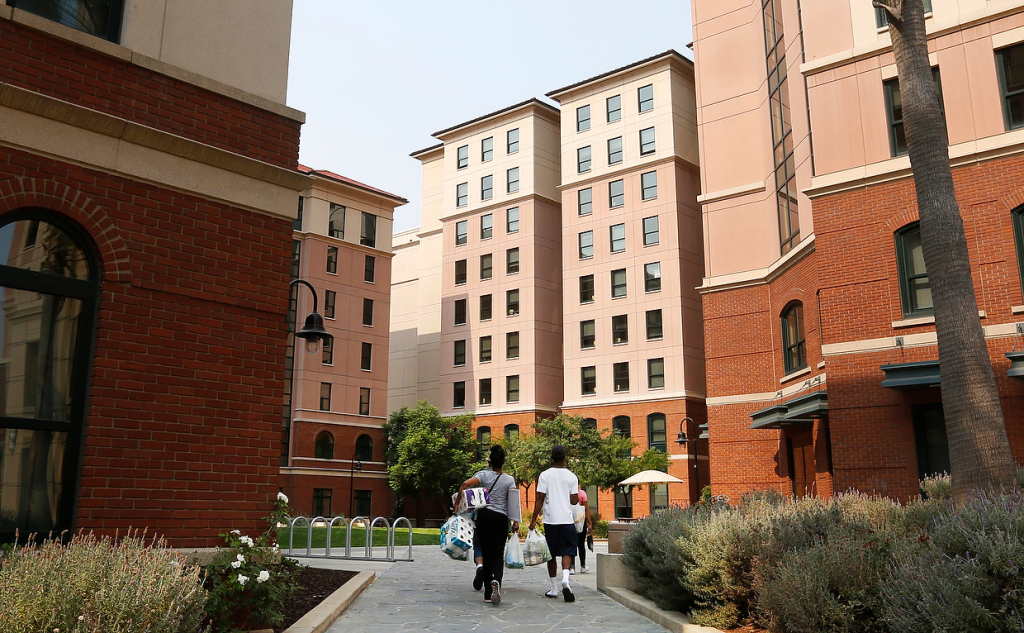Michelle Myers is a college admissions adviser based in the East Bay. She has dozens of clients set to attend the University of California system in the fall, “gazillions” in the California State University system and others in colleges across the west.
On a scale of 1 to 10, the level of concern among her clients about student housing for the fall is about a 17.
“People are incredibly concerned,” Myers said.
“They’re still focused on what instruction will be, what’s in person and what’s online and which courses they need to take. And that will help determine the housing plan…
“They’re waiting to see where they’re going to be absorbed.”
The angst isn’t limited to the students scheduled for dormitory life in the fall.
Those hoping to live anywhere on campus are facing an unprecedented situation as coronavirus wreaks havoc on every facet of higher education.
The physical distancing and mitigation requirements have forced universities across the country to reimagine campus life in the fall.
How much instruction will be in person?
How will the dining halls serve the campus community?
And what about housing, where the economic imperative collides with public health demands?
The California State University system will lean heavily on remote learning this fall: Most students won’t need to be on campus.
But the University of California and many private schools within the state are planning a mix of online and in-person instruction that will require the majority of students to live on or near campus.
Housing and dining are essential pieces of the $8 billion-per-year (approximate) sales-and-services revenue stream for the UC system.
Were the nine undergraduate campuses to shift to online-only instruction, the empty residence and dining halls would severely damage the system’s economic foundation.
Cal chancellor Carol Christ pegged the financial impact of coronavirus at $200 million — and that was just for the final few months of the 2019-20 academic year.
The UC needs students on campus this fall, and it needs to keep them safe.
That can only be accomplished with rigid social distancing measures in place for classrooms, dining halls and residences.
Some students secured off-campus apartments for the fall with deposits paid early in 2020, but many, including the freshmen, are in purgatory as they await details on campus life.
“It is unclear how the COVID-19 pandemic will impact our operations in student housing and residential life during the 2020–21 academic year and therefore we are unfortunately unable to provide a housing guarantee,” UCLA chancellor Gene Block wrote to the campus community in late April.
Cal’s return-to-campus operation includes a committee dedicated to the housing and dining piece. The school declined this organization’s request to interview vice chancellor Stephen Sutton, who leads the housing committee.
The UC campuses could announce their plans for the fall this week, based on the timeline laid out by university president Janet Napolitano last month.
Whenever the information starts to flow, it’s unlikely that students will be packed into campus residences as they have been for eons.
Will there be doubles?
Have triples gone the way of the Dodo?
And — crucially — where will the displaced students be housed?
Everyone is on edge.
“If the universities don’t want to pack the dorms like they have in the past, they’re going to resort to providing off-campus housing and partnering with hotels and privately-owned student housing communities,’’ said Ben Margolit, the CEO of Rentgrata, an online platform that helps students find off-campus housing communities.
“It’s getting to the point that there is pent-up demand, with a lot of students waiting to hear. Once the decisions are made, there’s going to be a mad dash to scoop up the housing that’s left.
“There’s a lot to worry about.”
The Bay Area News Group is here to help.
A few suggestions:
1. Buy time.
Each week, there is new guidance on coronavirus mitigation and new data on Covid-19 infection trends — a combination that creates uncertainty for higher education.
Myers’ advice for families awaiting word on instruction and housing plans:
“Find out the last day you have to pay, then check the pulse of the situation — whether it’s tuition or housing,’’ she said.
“Make sure you’re on top of the deposit situation, and pay at the very last minute so you have as much information as possible.”
At the same time, don’t be passive and assume the university will find suitable, safe housing for displaced students.
“I would look at it like you’re trying to get concert tickets,’’ she said. “Keep calling, keep emailing and try to upgrade in case you get kicked off the campus housing list.”
She proffered two possible options: Sorority houses sometimes have cottages behind them; and Airbnb homes/apartments located near campus.
The latter idea would work for students who have in-person instruction certain days each week but will otherwise be living at home.
2. Read the lease.
“If I were a student,” said Margolit, whose company partners with hundreds of student-housing communities across the country, “I would do everything I can to make sure there are favorable terms in the lease.
“If a second wave of the virus comes and campus has to shut down and students are cleared out, you need to have some ability for rent abatement.”
That said, off-campus housing complexes are not required to shutter if the campus closes.
“They can provide shelter for students who can’t go home,’’ he added.
3. Beware of detours.
Myers warned against students enrolling in community colleges as a temporary alternative if their four-year university moves to online-only instruction for the fall.
“You will lose your spot, even at the UCs and the CSUs,’’ she said.
“If you think you can pay your deposit and because the classes are online, you can do a community college, don’t.
“You should first get it in writing from a counselor that you won’t lose the spot.”
4. Consider a semester elsewhere.
For students unhappy with their classroom or housing situation in the fall, Myers suggests the National Student Exchange program.
Founded in 1968, the NSE allows students to spend a semester at another university — public schools only — without losing enrollment at their current institution.
Students pay in-state tuition, Myers said, but freshmen are not allowed to participate for their first semester.
“If you’re a student in California or Washington and not sure about the situation for the fall, they should seriously consider it,” she added.
“Right now, everything about the fall is like the craps table.”
*** Send suggestions, comments and tips (confidentiality guaranteed) to [email protected]
*** Follow me on Twitter: @WilnerHotline



















